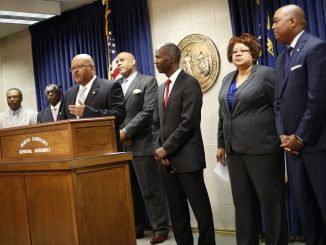RALEIGH — A North Carolina constitutional policy group has characterized the lawsuit filed by a teacher’s union affiliate over the state’s Opportunity Scholarship Program as “meritless.”
The N.C. Institute for Constitutional Law (NCICL) has published a brief outlining the main points of the complaint filed by the N.C. Association of Educators (NCAE). NCICL is a 501(c)3 non-profit that seeks to educate policy and lawmakers on N.C. constitutional law issues. The NCAE is an affiliate of one of the two largest teacher unions in the country, the National Education Association (NEA).
“The main thrust of the lawsuit attacks the rights of parents to choose and is an attack on religious schools in general,” said Jeanette Doran, President of NCICL.
The plaintiffs’ objections to religious schools take up over 66% of the complaint, which translates to 24 out of 39 total pages. Doran noted that the Opportunity Scholarship Program (OSP) is voluntary and does not require a family to apply for the funds nor to use the OSP funds to attend a religious school.
The NCAE and their plaintiffs are seeking to have the courts rule the OSP unconstitutional, as it is currently being implemented, under the North Carolina Constitution. They are asking for a permanent injunction to stop the selection of scholarship recipients, as well as any further disbursements or appropriations from the Reserve Fund.
The OSP grants up to $4,200 a year for tuition to participating private schools, which are chosen by the applicant’s family. The scholarships serve low-income families that meet certain income thresholds and other criteria to be eligible.
During the 2019–20 school year, 12,284 kids were in the program. Demand is high, as the program sees between 800-900 children waitlisted annually. Over 11,000 new applications have come in for the upcoming year so far, but there will likely be only around 3,000 open seats.
NCICL’s brief summarizes the lawsuit’s three main claims, which assert that the OSP violates the state constitution. The NCAE suit claims that the OSP subjects plaintiffs to religious discrimination and interferes with their rights of conscience; discriminates on the basis of religion, sexual orientation, gender identity and transgender status; and funds schools in an arbitrary and capricious manner not valid under constitutional authority.
The NCICL brief says that these claims “are all meritless.”
“What they’ve done is challenge the way the program is implemented,” said Doran, noting that the biggest weakness of the NCAE’s suit is trying to prove the public funds used for the program aren’t accomplishing a public purpose.
“That’s a big hurdle to get past — to say that the choices of parents are blocked or should be blocked because they are attributable to government,” Doran said. “No, they’re not. As a parent if you pick a religious school… you are picking a religious school. No one is forcing these parents or any other parent to choose a religious school.”
Doran also remarked on the COVID-19 school closures and that right now parents need every educational option available to them. Dr. Terry Stoops, vice president of research and director of education studies at the John Locke Foundation, agrees with Doran.
“The N.C. Association of Educators should be focused on helping educators prepare for the most difficult school year of their lives,” said Stoops. “Instead, NCAE leadership has committed its dwindling resources to a lawsuit designed to seize private school scholarships from low-income families and force children to return to dysfunctional district schools.”
Stoops also said that while the NCAE’s lawsuit pushes to limit options for families, COVID-19 school building closures have “compelled parents to explore multiple education options” for their children.
Lawmakers have also weighed in on the suit, with Sen. Deanna Ballard (R-Watauga), a co-chair of the Senate Education Committee, stating that, “The far-left NCAE says it cares about equity in schooling, but it’s suing to ensure low-income families can’t afford to send their children to private school.” She added that this suit would “strip low-income children of the only chance they have to attend private schools, which are open for in-class instruction.”
This is the second attempt by the NCAE to dismantle the OSP. The first suit was an unsuccessful facial challenge to the statute supporting the OSP. In 2015, the N.C. Supreme Court ruled in favor of the OSP by a vote of 4-3 along partisan lines. In the majority opinion, Chief Justice Mark Martin said the plaintiffs failed to prove the program was unconstitutional and that the lower court “erred in declaring the Opportunity Scholarship Program unconstitutional.”
Associate Justices Beasley, Hudson and Ervin dissented in 2015. When Martin retired in 2019, Beasley was elevated to chief justice by Gov. Roy Cooper. Martin’s retirement left the court’s make-up in a hyper-partisan state of six Democrats to one Republican — Associate Justice Paul Newby.
The Raleigh based non-profit Parents for Educational Freedom in North Carolina (PEFNC), which advocates for quality educational options through parental school choice, was a vocal defender of the OSP during the first lawsuit brought by the NCAE and various other plaintiffs.
“This lawsuit is a political stunt in line with the education establishment’s obsession with dismantling school choice in North Carolina, even as thousands more parents are flocking to alternative educational options,” said PEFNC President Mike Long in a statement.
“Perhaps the NCAE’s time would be better spent considering why more than 20% of N.C. families are choosing alternatives to their locally zoned public school, including 12,284 students from low-income families who received Opportunity Scholarships during the previous school year,” Long said.



